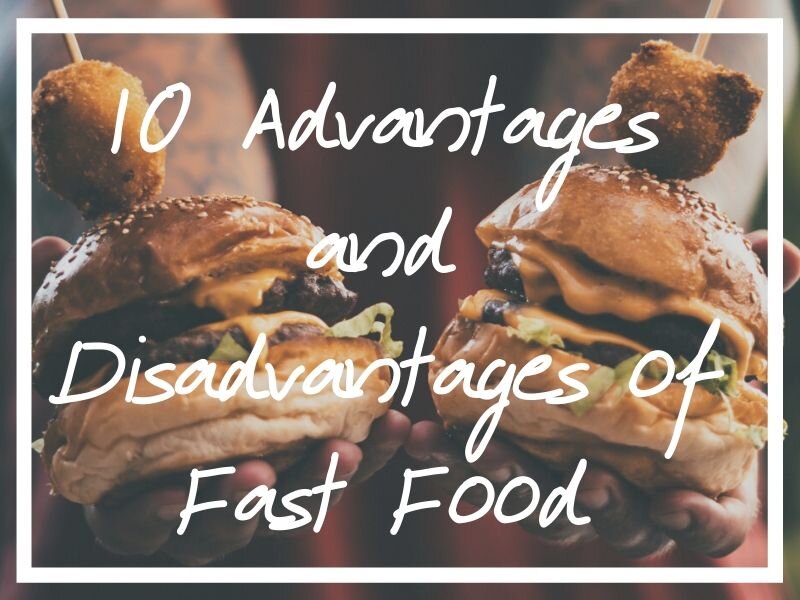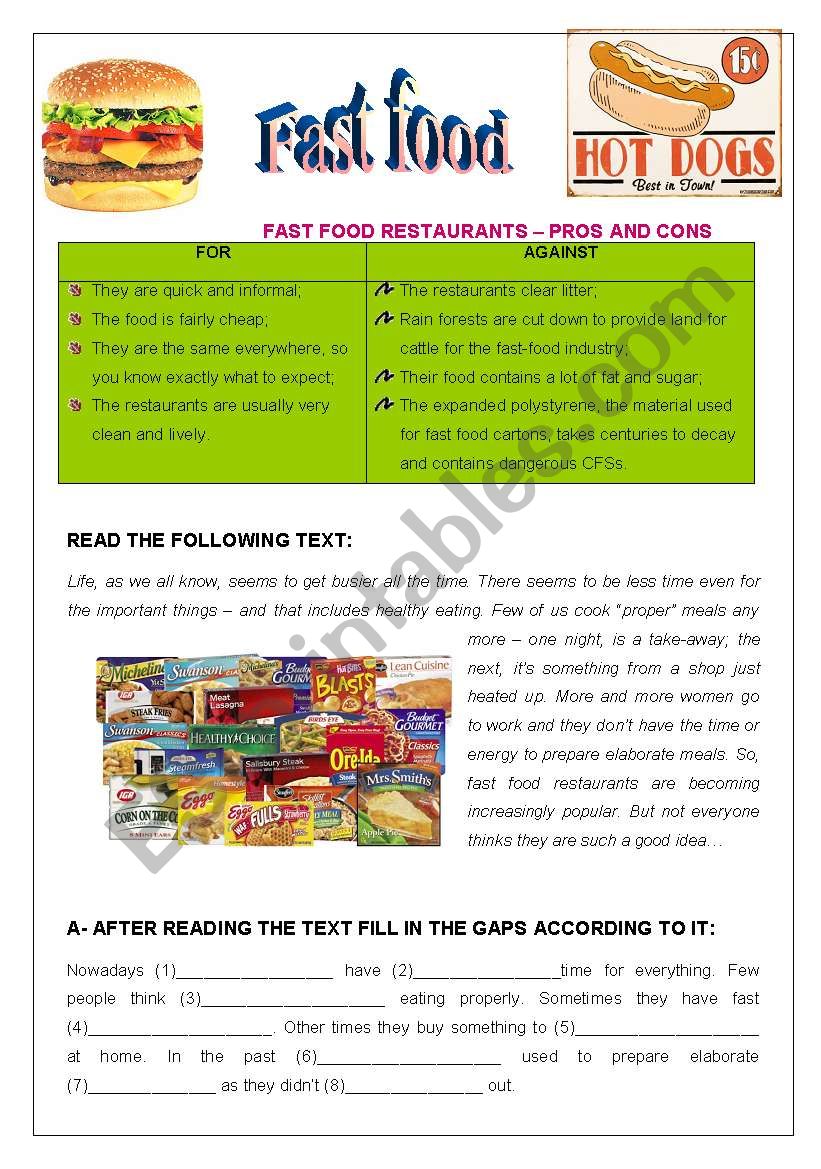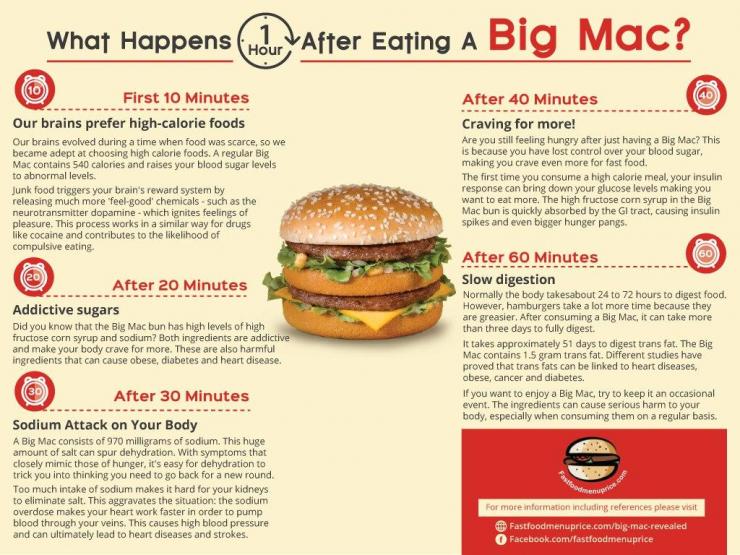Do you love the convenience of fast food but worry about its health effects? Trying to make an informed decision about your meals can be tricky. That’s why we’re here to help! In this blog post, we’ll lay out all the pros and cons of eating fast food so that you can make a more informed decision. Read on to learn more!

Introduction
Eating fast food has become a part of everyday life for many people. It is an easy and convenient way to get a meal on the go. But, while fast food may provide convenience, there are potential drawbacks that need to be taken into consideration.
The pros of eating fast food include being able to save time when you don’t have the opportunity or time to cook a meal. Additionally, it can help prevent skipping meals if you are in a hurry or just don’t have the energy for cooking. However, one downside is that fast food is typically poor in terms of nutrition and some experts consider it to be as harmful as tobacco due to its negative effect on public health.
Another issue with fast food is the quality of ingredients used which can often be subpar compared to home-cooked meals. Additionally, prices can vary depending on the restaurant and may not always be affordable for some people.
Overall, eating fast food should be done with caution and in moderation if possible. It should not replace home-cooked meals but rather act as an occasional treat or quick meal when needed most. Making sure you know what ingredients are being used and where they come from will also help ensure

What is Fast Food?
Fast food has become a staple in modern society, and while it can be convenient and affordable, it’s important to understand the pros and cons of eating fast food. On the positive side, fast food is often a saving grace for those who are short on time or have limited access to other sources of nutrition. Fast food can also provide complete meals at an affordable price. However, there are some potential drawbacks to consider with fast food as well. The high calorie content of many popular items is one potential concern, as this can lead to obesity if consumed in excess. Additionally, many fast food items are high in sodium, sugar and fat which can have negative impacts on blood pressure and inflammation levels over time. Ultimately the decision to eat fast food should be made carefully after considering all the risks associated with consuming it.

The Pros of Eating Fast Food
Eating fast food has many advantages, including convenience, saving time and cost-effectiveness. However, it is important to be aware of the potential drawbacks such as high calorie content, unhealthy ingredients and an increased risk of obesity and diabetes.
One of the major pros of eating fast food is its convenience. Fast food restaurants are often located in close proximity to one another, making them very easy to access for a quick meal. Additionally, ordering is simple and straightforward as there are usually limited menu options available.
Another advantage of fast food is that it saves time compared to cooking at home or dining out. As such, it can be a great option when you don’t have much time or energy but still need to eat something quickly. Moreover, since fast food meals are usually cheaper than restaurant meals, they can be more cost-effective in certain situations.
Unfortunately, there are some cons associated with eating fast food as well. First off, these meals tend to be high in calories due to their large portion sizes and unhealthy ingredients such as sodium and sugar which can contribute to weight gain over time if consumed regularly. Furthermore, due to their high fat content they may increase your risk of developing chronic diseases like

The Cons of Eating Fast Food
Eating fast food has both pros and cons. It can be convenient, but there are also potential health risks associated with it. Fast food is high in calories, sodium, sugar, and fat. Eating too much of it can lead to weight gain and an increased risk of obesity, heart disease, and type 2 diabetes.
Eating fast food also increases the chances of developing dementia later in life. All in all, fast food should be eaten in moderation if you choose to eat it at all. To ensure optimal health benefits from your diet, make sure to include a variety of whole foods that provide essential vitamins and minerals for your body’s needs.
Nutritional Value of Fast Food
Eating fast food can be a convenient and time-saving option, however there are many potential risks associated with it. It is important to be aware of the nutritional value of fast food and its potential effects on your health.
On the plus side, fast food can save time and provide convenience for busy lifestyles. However, it is usually high in calories and fat content and may lack essential nutrients like vitamins and minerals that your body needs to stay healthy. Eating too much fast food can also increase your risk of metabolic syndrome, which is a cluster of conditions that include high blood pressure, elevated triglyceride levels and increased blood sugar levels.
To maintain good health when eating fast food, it is important to choose items with more nutritional value such as lean proteins or vegetables. Additionally, watch out for hidden sugars as they can add extra calories without providing any additional nutrition. Finally, keep portion sizes in mind when choosing meals as they are often larger than recommended amounts.
Overall, while it may be convenient to eat fast food from time to time, it is important to be mindful of its nutritional value in order to avoid any potential negative consequences on your health.

Impact on Health and Wellness
Eating fast food can have a number of pros and cons when it comes to health and wellness. On the one hand, fast food is convenient, but it can lead to serious health problems like increased inflammation and blood sugar levels. Additionally, fast food is usually high in fats and sugars, which can affect the brain in the same way as drug addiction. On the other hand, eating healthy foods like fruits, vegetables and lean proteins are essential for good health status and lowering your risk for developing health problems. Furthermore, studies have found that children who eat junk food four to six times a week had lower math and reading skills compared with those who didn’t eat so much junk food. Lastly, fasting diets may not be ideal if you don’t replace the same amount of nutrients as you would without fasting. In conclusion, while there are advantages to eating fast food such as convenience or cost savings, it should be eaten sparingly due to its potential negative impacts on physical health and mental wellbeing.

Environmental Impact of Fast Foods
Eating fast food has become very popular in recent decades, but there are both pros and cons to consider when it comes to the environmental impact of fast foods. On the one hand, it is convenient and affordable way to get a meal quickly, but on the other hand, it can have a negative environmental impact due to packaging waste, high calorie content and lack of compliance with hygiene standards.
The short-term impacts of eating fast food include an increase in blood sugar levels, blood pressure and inflammation. Eating too much junk food can also mean that an individual does not eat enough necessary nutrients for proper health. In terms of long-term effects, research has shown that eating too much fast food can lead to obesity, heart disease and type 2 diabetes.
Thus, while eating fast food does have its advantages – such as providing people with affordable access to calories – it is important to be aware of its potential negative impacts on health and the environment. Individuals should aim for balance in their diets by limiting their consumption of unhealthy foods while still enjoying occasional treats.

Social and Cultural Significance
Fast food has become an increasingly popular staple in many people’s diets. While it is convenient and often relatively inexpensive, there are several pros and cons associated with eating fast food that need to be considered. The long-term health risks associated with fast food consumption can include obesity, heart disease, and other health problems. Additionally, fast food consumption can lead to increased calorie intake which can contribute to weight gain.
On the other hand, there are some social and cultural benefits associated with eating fast food. For example, it provides people with easy access to affordable meals on the go. It also makes life more convenient for busy individuals who may not have time to cook a meal from scratch or don’t have access to healthy ingredients for an at-home meal.
Ultimately, it is important for individuals to consider both the pros and cons when deciding whether or not to eat fast food regularly. To successfully promote healthy eating among children and adults alike, we need to adopt a comprehensive community approach that focuses on improving accessibility of healthier options while educating individuals about the importance of balanced nutrition. With this approach in place, we can make sure that everyone has access to the nourishment they need while avoiding any potential negative consequences from consuming

Alternatives to Eating Fast Foods
Eating fast food and junk food has become increasingly popular in the past few decades. While it can be a convenient and quick meal option, it is important to understand the pros and cons of consuming these types of foods.
The pros of eating fast food include the convenience factor, as well as the fact that it can prevent skipping meals entirely. Additionally, some people may find that they enjoy the taste or texture of certain fast food items.
However, there are several potential downsides to eating too much fast food. Such foods are often high in calories and low in nutrients, meaning they can lead to weight gain and other related health issues like obesity, inflammation, digestion problems, heart health concerns, and weakened immunity over time. Additionally, many fast-food products contain synthetic ingredients which could cause allergies or other reactions for sensitive individuals.
Fortunately there are plenty of alternatives available for those looking to avoid this type of cuisine but still want something quick and easy to eat. From home-cooked meals you prepare ahead of time stored in your refrigerator or freezer to fresh salads with protein rich toppings available at most grocery stores – there’s something out there for everyone! Ultimately it’s important to understand both sides before making

Plant Based Options
For those looking to make healthier food choices, plant-based diets have become increasingly popular. Plant-based diets emphasize vegetables, fruits, legumes, nuts, seeds and whole grains while eliminating animal products such as meat and dairy. Plant-based foods are typically lower in saturated fat and calories than meat products, although they may be higher in sodium.
The health benefits of plant-based eating are undeniable: lower risks of heart disease and type 2 diabetes are just two examples. However, vegan fast food alternatives can be misleading; many contain more sodium than animal meats and some contain added sugar or unhealthy fats. Additionally, it is important to remember that veganism is a social justice movement rather than a fad diet.
When it comes to convenience versus healthy choices, time is an invaluable commodity that should not be taken for granted. While frozen meals often promise convenience with minimal effort on our part, it is important to recognize the nutritional value of each meal we consume in order to make healthier decisions in the long run.
Homemade Meals
Eating fast food and homemade meals both have their pros and cons. Fast food is convenient, but it lacks the nutritional value of a home-cooked meal. On the other hand, cooking your own meals can be time-consuming, but you know exactly what goes into each dish. It’s important to consider both the advantages and disadvantages when deciding whether to prepare a meal at home or choose fast food.
One advantage of eating fast food is its convenience. You don’t need to go grocery shopping or spend hours in the kitchen preparing meals. Fast food is also typically cheaper than buying groceries and cooking at home. However, fast food often contains unhealthy ingredients like additives and preservatives that can lead to health problems in the long run.
In contrast, home-cooked meals provide more nutritional value than restaurant meals as you have control over what goes into them. Eating homemade dishes allows you to customize recipes according to your tastes while ensuring that all ingredients are fresh and healthy for your diet. On the downside though, making your own meals takes time—you need to shop for groceries, cook the ingredients, and clean up afterward—which makes it difficult for busy people with limited free time on their

Meal Delivery Services
Meal delivery services are becoming increasingly popular as they offer an easy way to get restaurant-quality food delivered straight to your door. With the convenience of online ordering, customers can choose from a variety of delicious meals that are often healthier than traditional fast food options. Plus, with portion sizes tailored to individual needs, meal delivery services are great for those who want to avoid leftovers or limit their calorie intake.
However, there are some downsides to using meal delivery services worth considering. Many meals come pre-cooked and require reheating at home which can reduce the quality of the food and flavor. Additionally, many of these meals contain empty calories due to processed ingredients used in fast food dishes such as pizza, french fries and chicken nuggets. Furthermore, you need to make sure all your ingredients have been used within a few days as they will mostly be perishable goods.
Overall if you’re looking for convenient restaurant-style meals delivered directly to your door then meal delivery services could be a great option for you. Just make sure you research into each service’s quality of ingredients and prices before committing so that you can make an informed decision about what is best for your budget and dietary needs.
Eating Out Responsibly
Eating fast food can be convenient and cost-effective, but it is important to know the pros and cons of eating fast food before making a decision. On the plus side, fast food is quicker and easier to obtain than preparing a meal at home. Fast food restaurants are also typically cheaper than other dining options. However, there are some major drawbacks associated with regularly eating fast food. Eating fast food regularly can lead to weight gain, high blood pressure, headaches, and dental distress. Additionally, many of the products from fast-food chains contain high concentrations of sugars and fats that can be detrimental to your health over time.
When making decisions about where to eat out responsibly, it is important to weigh both the pros and cons of eating at a fast-food restaurant. While convenience and price may be appealing factors for some people on certain occasions, it’s essential to consider the long-term implications of consuming too much junk food on a regular basis. With careful consideration when deciding where to eat out responsibly you can ensure that you make smart decisions about what you choose to put in your body!

Tips for Making Healthier Choices at Fast Food Restaurants
Fast food is a staple in many people’s diets. Eating fast food and junk food can be convenient, but it can also have negative effects on your health. It’s important to understand the pros and cons of eating fast food so you can make healthier choices when you eat out.
The pros of eating fast food include saving time and money, as well as convenience. However, there are also several cons associated with regularly consuming fast foods such as headaches, dental distress, extra weight gain, high blood pressure and risk of metabolic syndrome due to higher levels of triglyceride and added sugar.
It is important that we maintain variety in our diets so that we don’t miss out on any essential nutrients. This means limiting the amount of similar types of fast food you eat frequently and opting for healthier alternatives such as grilled chicken instead of fried chicken or whole wheat buns instead of white buns whenever available. In order to make healthier choices at fast food restaurants it is advised that we look for meals with more vegetables, lean proteins like grilled or roasted meats/fish/poultry or plant-based proteins like beans/lentils/tofu; opt for items with fewer ingredients; choose whole

Making the Most Out of Your Meal at a Fast Food Restaurant
Eating fast food has both pros and cons. On the one hand, it is convenient and can save time when a meal is needed. However, it can also contain high amounts of calories, sodium, sugar and fat which can lead to obesity if not monitored properly. To make the most out of your meal at a fast food restaurant, it’s important to understand the menu options and choose healthy items that are low in fat and calories. Additionally, try to stay away from sugary drinks or those containing artificial sweeteners as they can be unhealthy in large quantities. Finally, limit eating meals at fast food restaurants as much as possible to maintain a healthy lifestyle.

![sander-dalhuisen-nA6Xhnq2Od8-unsplash[1]](https://www.viralstories360.com/wp-content/uploads/2022/12/sander-dalhuisen-nA6Xhnq2Od8-unsplash1.jpg)